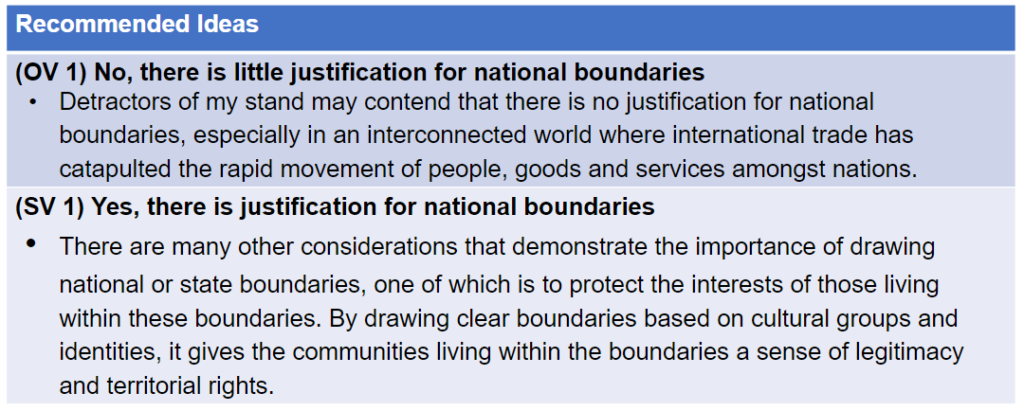The justification for national boundaries is a debated topic in today’s globalised world. This post explores the reasons behind the establishment and preservation of national borders, considering cultural, political, and social factors that contribute to their significance.
GCE A-LEVEL ESSAY QUESTION:
‘In the global village we inhabit, there is no justification for national boundaries.’ How far do you agree? (GCE 2018)
Question Analysis:
- ‘global village’ → highly interconnected / one united world
- ‘inhabit’ → live in / thrive
- ‘justification’ → reason / substantial support / evidence / strong argument
- ‘national boundaries’ → national borders / territories
- Global context
- Point of Contention (POC): ‘is’ / ‘is no justification’
- Proposed Stand: There is justification for national boundaries
Possible Ideas:
Legend:
SV = Supporting Viewpoint
OV = Opposing Viewpoint

Sample Paragraphs:
(OV 1)
Detractors of my stand may contend that there is no justification for national boundaries, especially in an interconnected world where international trade has catapulted the rapid movement of people, goods and services amongst nations. Indeed, I acknowledge that with few border controls and restrictions, the reduced amount of bureaucracy and red tape has enabled trade between countries to be more fluid and frequent. For example, European Union (EU) Member States have benefitted greatly from the reduction of trade costs in the form of high trade tariffs and limited quota on trade volume. The Netherlands is one such example of an EU Member State that benefitted greatly from this, with 3.1 per cent of their Gross Domestic Product (GDP) attributed to EU trade alone – according to CPB Netherlands Bureau for Economic Policy Analysis. The European Internal Market also guarantees the free movement of goods and services within the EU, which is particularly important for imports and exports to flow in and out of the Member States. This guarantee alone accounts for 80 per cent of Dutch trade benefits. As a result, without restrictions and tight border controls, countries are more able to freely engage in trade, boosting economic growth for all parties involved. Thus, this argument lends credence to critics’ stand that there is little to no justification of having national boundaries, especially in a world where international cooperation and trade are crucial for prosperity.
(SV 1)
However, while international trade and cooperation is a key factor in having fewer restrictions and border controls, there are many other considerations that demonstrate the importance of drawing national or state boundaries, one of which is to protect the interests of those living within these boundaries. By drawing clear boundaries based on cultural groups and identities, it gives the communities living within the boundaries a sense of legitimacy and territorial rights. To illustrate my point, the Sykes-Picot Agreement concluded in May, 1916 after the defeat of the Ottoman Empire where France and Britain divided the Arab territories of the former empire into their respective spheres of influence, with the Sykes-Picot line drawn as partitions. A few years later, these territories were governed as mandates. The borders of these mandates split up Arab lands and ultimately led to the modern borders of Iraq, Israel and the Palestinian territories, Jordan, Lebanon and Syria. Even though these mandates’ borders were not determined until several years later, the agreement sets the precedent for them, perpetuating lingering resentment well into modern times. The reason is because the borders were drawn based on arbitrary terms by external parties with presumably imperialist motivations, splitting up indigenous populations, like the Kurds and the Druze, leaving them as minority populations in several countries as a result. Such an example demonstrates the importance of drawing national boundaries, but not merely for the sake of pandering to imperialist notions. Instead, it should be based on cultural identities and communities to maintain these groups’ legitimacy and right to protect their territories in times of conflicts. Because of such territorial ambiguities, it is of little surprise that they have formed the basis of many recurring conflicts in the Middle East, such as the Syrian Civil War, today. Should there be no justification for national boundaries, it would leave even greater room for ambiguity and sow the seeds for more territorial disputes in today’s world. Therefore, I argue that there is justification for imposing national boundaries, but it should be based on cultural identities and communities to protect their interests within their territories.




